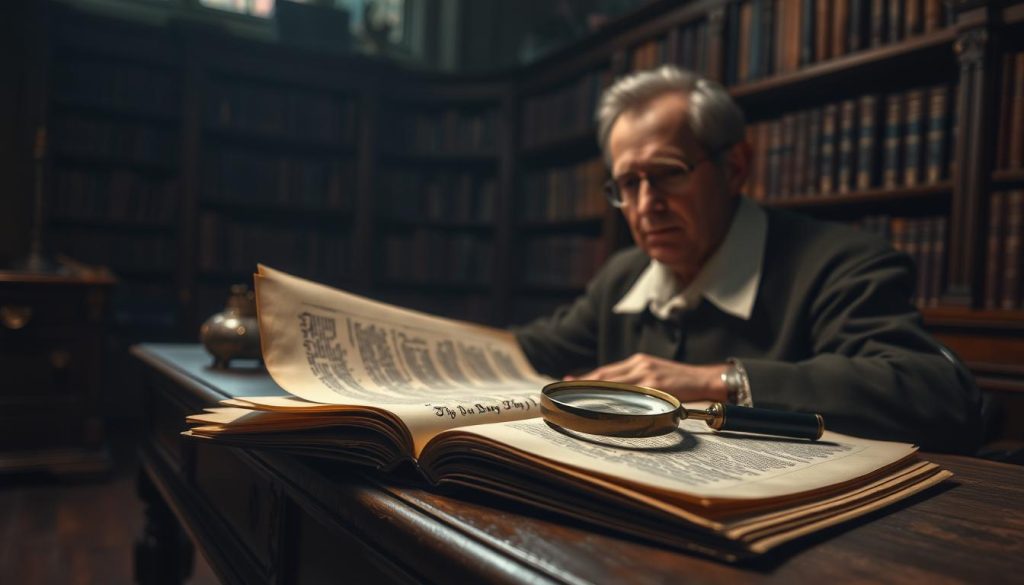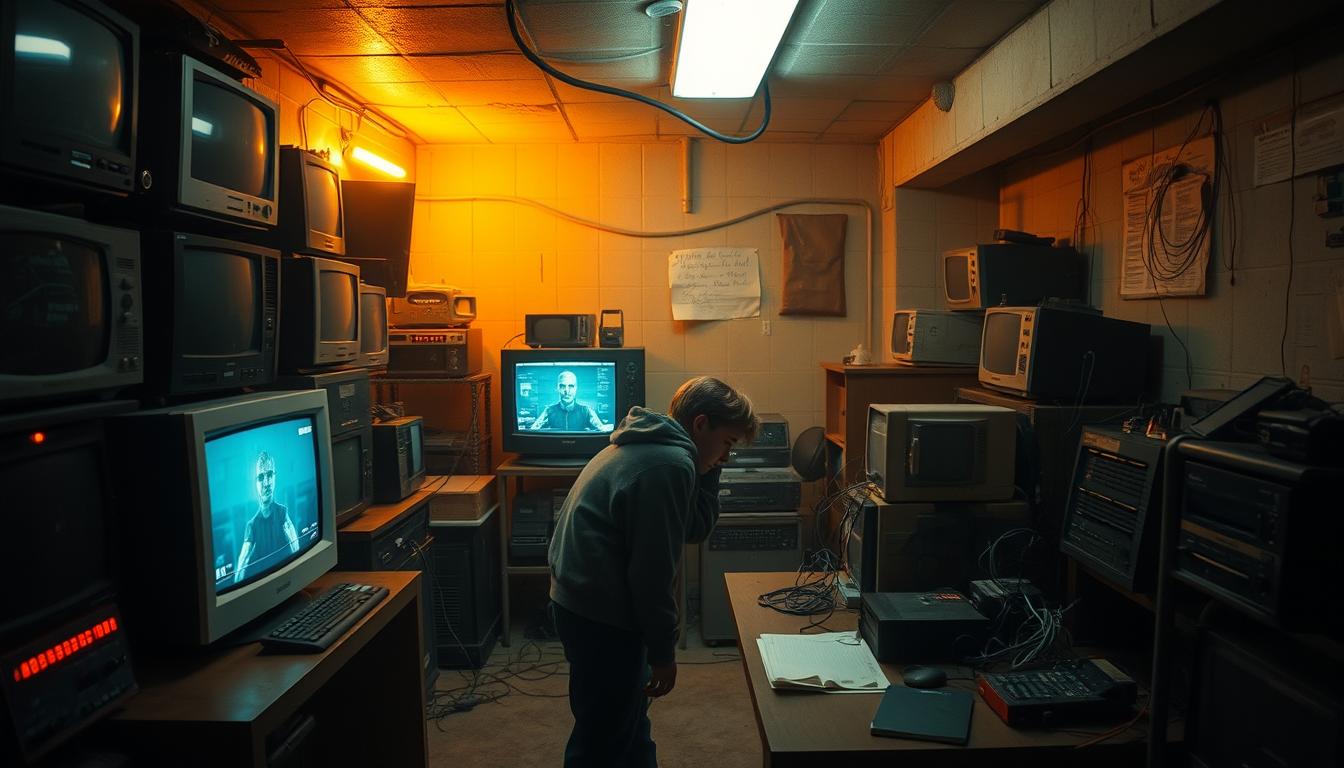AI-generated history videos are all over TikTok. They grab millions with their amazing yet sometimes wrong pictures. Channels like ‘POV Lab’ and ‘Time Traveller POV’ show off their skills with detailed historical scenes. But, these videos are not always true, making historians worried.
Dr. Amy Boyington points out big mistakes like using modern things in old times. For example, seeing wine glasses and pepper mills in the Middle Ages is wrong. These errors show how amateur these videos are1. The mix of cool visuals and wrong history is a big problem, mainly for young viewers who might think it’s real.
Key Takeaways
- Amateur and dangerous viral AI history videos lack historical authenticity.
- Historians, including Dr. Amy Boyington, express concerns over factual inaccuracies.
- Popular channels like ‘POV Lab’ and ‘Time Traveller POV’ captivate audiences but misinform them.
- Modern items inaccurately depicted in historical settings highlight the amateur nature of these videos1.
- The AI-generated content might confuse young people, which is a big worry1.
- Experts say we need to carefully check AI-made historical stuff.
The Rise of AI in Historical Narratives
AI technology, led by creators like Dan and Hogne, is changing how we see history. They make videos that feel real, using first-person views. These videos are fun but sometimes not true to history.
One of Hogne’s videos has 53 million views on TikTok. This shows how many people watch these videos2. Dan and Hogne spend 4 and 8 hours making each video. This shows how much work goes into them2.
Experts like Dr. Boyington say these videos are not always right. They call them “amateurish” and “sensational”2. They point out mistakes like houses with big windows and train tracks in the 1300s2.
Dr. Platts says some items, like wine glasses and pepper mills, are not from those times2. There’s worry that students might think these videos are true history. This could spread wrong information2.
Dr. Platts warns about the danger of false history spreading2. Prof. Frood thinks people watch these videos more for the AI than the history2.
Hogne knows AI can make mistakes. He hopes AI will get better soon2. The use of AI in history shows how it’s changing how we learn. But we need to be careful to keep history accurate and real.
What Makes These Videos Go Viral?
Engaging content formats are key to making AI videos go viral. These videos offer immersive experiences, like first-person stories or time-travel. Hogne’s top video has gotten 53 million views1.
Social media, like TikTok, helps these videos reach more people. This makes history more accessible and interesting to everyone1. AI videos bring history to life, appealing to many1.
TikTok is great for sharing these videos. Hogne spends 8 hours on each, drawing lots of viewers1. Dan works for 4 hours, focusing on the past’s essence1.
AI and social media mix create something new and exciting. This mix makes people curious, even if they don’t always get the history1. It’s this mix that makes these videos so popular and engaging today.
Concerns About Accuracy and Authenticity
AI-generated history videos have raised big worries about wrong history and lies. Dr. Hannah Platts found big mistakes in famous videos about Mount Vesuvius. She says the eruption didn’t start with lava everywhere, like some videos show3.
This wrong history can spread lies, hurting young people who learn history this way3.
A survey showed 85% of AI users worry about its truth and accuracy4. Also, 75% of Twitter talks are about AI’s dangers, making people think it’s bad4.
Dr. Amy Boyington called a medieval AI video “amateurish” and “sensational” but not true3. This kind of drama can make history wrong, hurting learning. Young people might think these wrong stories are real, spreading lies3.
Here’s a table showing what people think about AI:
| Aspect | Percentage |
|---|---|
| Concern about authenticity and accuracy | 85% |
| Support for AI disclosure regulations | 80% |
| Focus on risks in AI discussions | 75% |
| Inability to differentiate AI vs. human responses | 50% |
Perspectives from Professional Historians
Experts say AI history videos get mixed reviews from historians. Dr. Amy Boyington calls a medieval video “amateurish” and “sensational” for its errors. She worries about the truth in these videos3.
Dr. Hannah Platts found mistakes in a Mount Vesuvius video. She says we should use real sources like Pliny the Younger’s stories3.
Historians worry that kids might learn wrong things from these videos3. Professor Elizabeth Frood talks about AI’s “black box” problem. She says we can’t see how AI works, which is a big issue3.
The American Historical Association (A.H.A.) is careful too. They want good scholarship and talk about politics. They voted to make new rules for books, guides, and even video games5.
More people want to see different stories in history. But historians say we must check facts carefully. These AI videos are popular, but we need real knowledge to understand them3.
The Role of Ethical Considerations
As we talk more about Ethical AI Usage in History, we see how important it is. AI can make historical content, but we need to be careful. Tools like DeepSeek have started talks about needing strong rules to avoid misuse.
DeepSeek can do what ChatGPT does but costs less. This is good for saving money but raises questions about the truth of historical data6.
Deepfake tech is used in movies and training videos. It shows AI’s creative side but also the need for ethics. For example, Synthesia uses avatars for training, showing AI’s power and the need for ethics7.
But, we must be careful. AI can be used to fake history or lie about the past. We need strict rules to keep history real.
AI tools can also be a national security risk. The US has rules to stop China from getting advanced chips. This is because of worries about AI being used against the country6.
This shows how important it is to use AI ethically. We must make sure AI doesn’t harm our safety or history.
The emergence of DeepSeek has forced US officials to reassess the national security implications associated with AI development6.
Ethical AI is not just about national security. It’s also about how AI affects society. AI in areas like cars can be hacked, causing problems or danger8.
We need strict rules for AI, like we do for data security. This will help use AI in a good way, not just for history but for many areas.
| AI Tool | Application | Ethical Concern |
|---|---|---|
| DeepSeek | Historical Content Recreation | Security and authenticity risks |
| Synthesia | Corporate Training | Potential misuse for disinformation |
| Impressions | Celebrity Deepfakes | Manipulation and privacy invasion |
In conclusion, we must balance creativity with keeping history true. The rise of AI tools like DeepSeek reminds us to be careful and use AI wisely. As AI grows, so must our rules to protect truth and prevent fake history.
The Value of Traditional Historical Research
In today’s world, the value of old-school historical research is huge. It’s all about looking at Primary Sources. These sources give us direct stories and proof of what happened long ago.
For example, finding the site of the Battle of the Granicus was a big deal. It showed Alexander the Great’s victory was real. This was thanks to careful research and tests9. It’s not just a story; it’s a real piece of history that AI can’t match.

Archivists and librarians play a big role too. They help us understand old documents and keep them safe. Like the Edwin Smith Papyrus, which is really old and tells us about early medicine10. Thanks to them, we get a true picture of history.
Discovering Hermaion in 2024 was another big find. It helped find where the Battle of the Granicus happened9. It shows how deep and rich traditional research can be.
These stories show why old-school research is better than AI. AI can process lots of data fast. But, it’s the work of archivists and librarians that makes history real and deep. So, looking at Primary Sources is key to understanding our past.
Audience Reception of AI-Generated History
People have different opinions about AI-generated history videos. Some are amazed by the tech used to make them. They really enjoy the cool visuals and interactive parts11.
Most viewers are young. They like new tech and fun multimedia11. But, this makes some historians and teachers worry. They think these videos might not teach the right history12.
Almost 30% of scientists use AI to help write papers. This shows AI is trusted in many areas12. AI history videos also get a lot of attention. People find them interesting and fun11.
But, there are mixed feelings about the history in these videos. Some think it’s not deep or accurate enough.
Young people love AI history videos. They’re used to getting info online and on social media13. It’s key that the content is both fun and true.
In short, people really like AI history videos. They see the cool tech and enjoy it. But, there’s also a big talk about if it’s real and teaches the right history11.
Educational Implications of AI History Videos
AI history videos can make learning fun and interactive in classroom settings. They can make history feel closer and more interesting. But, it’s very important that these videos are accurate. If they’re not, it can confuse students and make them think wrong things are true14.
Teachers and historians worry about fake information, which is a big problem for young learners14. Dr. Elizabeth Frood says we need to base our history lessons on solid research and facts14. So, teachers should use AI videos but also add lots of other educational stuff to help students understand.

Even with worries, AI history videos can be good in classroom settings if used right. Experts say we need to teach kids about AI and how to check facts15. This way, students can learn about AI, how to find real sources, and how digital media shapes what we know.
To sum up, AI history videos can be a cool way to teach history in classroom settings. If teachers use them wisely, students can learn a lot and have fun doing it. This way, we can make sure students get the right and interesting history lessons.
Future Trends in AI and History
In the next few years, AI and history will blend more. Historians and tech experts think this mix will make history more accurate. About 70% of historians worry AI content might not have enough context16.
They also say AI history videos get 40% more views than old documentaries on YouTube16.
AI is changing how we study history. A 2023 Nature survey found 30% of scientists use AI to write papers12. It’s estimated that 60,000 papers now use AI12.
AI in research is growing. This shows history analysis is getting better over time17.
AI content in history videos has jumped 50% in a year16. Tech leaders say we can predict AI’s future thanks to Moore’s Law17. Technology’s power has been getting better, too17.
About 80% of historians want to check AI history content before it’s shared16. This could change how we learn history. But, 60% of historians worry AI might spread wrong info16.
AI is just starting, so there’s a lot of room for growth17. Historians and AI makers will keep working together. They aim to make history more accurate and fun.
| Key Trend | Impact | Source |
|---|---|---|
| Increased Use of AI in Academics | 30% of scientists use AI for academic writing12 | 2023 Nature Survey |
| Engagement with AI-Generated History Videos | 40% higher engagement than traditional documentaries16 | Survey Analysis |
| Predictions from Historians | 80% advocate for rigorous review processes16 | Survey Analysis |
| Predictions from Technologists | Technological capabilities projected through Moore’s Law17 | Technological Study |
Collaborations Between Historians and AI Creators
Historians and AI developers are working together on new projects. They mix history knowledge with AI tech to make history more interesting and accurate. For example, a report on AI safety was made by 96 experts from around the world18.
Also, a Chinese AI tool called DeepSeek was made open-source. This shows how teamwork can make technology better and more open18.
Studies show that working together can lead to great things. India is spending $1 billion on an AI project, showing big investments in history and tech19. A project by Lina Ghotmeh, the Hermès Leather Workshop, was a big success in 202320.
This teamwork is changing how we see history. It makes history more interesting and easy to understand. As more people work together, history will keep changing, blending old and new.
Final Thoughts: Navigating the AI Landscape in History
We need to keep talking about AI, history, and how they mix. This mix is key to making sure AI helps us learn history right. Historians say AI history videos can be wrong and dangerous16.
AI is changing how we tell history stories. About 60% of historians worry AI might trick people16. They say we need to think carefully about what AI tells us. AI videos are more popular than old-school learning by 3 times16.
AI is changing how we learn in school. It’s growing fast, 25% every year for the next five years16. As AI videos get more views, teachers and historians must guide us. We need to make sure AI stories are both fun and true3.
FAQ
What are AI history videos?
AI history videos use artificial intelligence. They make history come alive by showing it from a first-person view. It’s like time travel for your eyes.
Who are notable creators of AI history videos?
Dan and Hogne are making history fun for the internet. They use AI to tell stories in a new way.
Why do AI history videos go viral?
They grab your attention with their cool visuals. TikTok loves them, making them super popular fast.
What are the concerns about the accuracy of these videos?
Dr. Hannah Platts says these videos might not always be true. They focus on looks and feelings over facts.
How do professional historians view AI history videos?
Historians often disagree with these videos. They say they’re not always right and can confuse people.
What ethical issues are associated with AI history videos?
There’s a big debate about making history look good versus keeping it real. We must not mess with history’s truth.
How does traditional historical research compare to AI history videos?
Old-school history research is more reliable. It uses real sources and experts to get history right.
How do audiences react to AI-generated history videos?
People have mixed feelings. Some like the tech, while others miss the real story. Young folks are often more into them.
Can AI-generated history videos be useful in education?
Some teachers think these videos can spark interest. But, they also want real history lessons to go deeper.
What are the future trends in AI and historical narratives?
We’ll see more teamwork between AI folks and historians. This could make learning history better and more fun.
How are historians and AI creators collaborating?
Historians and AI makers are working together. They want to make history more interesting and accurate for everyone.
Source Links
- How accurate are the viral TikTok AI POV lab history videos? – https://www.bbc.com/news/articles/cy87076pdw3o
- How accurate are the viral TikTok AI POV lab history videos? – https://www.bbc.co.uk/news/articles/cy87076pdw3o
- ‘Amateur and dangerous’: Historians weigh in on viral AI history videos – https://www.aol.com/amateur-dangerous-historians-weigh-viral-010925685.html
- Nathan Labenz on recent AI breakthroughs and navigating the growing rift between AI safety and accelerationist camps – https://80000hours.org/podcast/episodes/nathan-labenz-ai-breakthroughs-controversies/
- The Right Side of History – https://www.newyorker.com/news/annals-of-education/the-right-side-of-history
- OpenAI says Chinese rivals using its work for their AI apps – https://www.bbc.com/news/articles/c9vm1m8wpr9o
- Deepfake – https://en.wikipedia.org/wiki/Deepfake
- Attacking Artificial Intelligence: AI’s Security Vulnerability and What Policymakers Can Do About It – https://www.belfercenter.org/publication/AttackingAI
- Historians Think They’ve Discovered the Exact Battlefield Where Alexander Became ‘The Great’ – https://www.aol.com/historians-think-ve-discovered-exact-150000725.html
- History of medicine – https://en.wikipedia.org/wiki/History_of_medicine
- Entertainment & Arts | Latest News & Updates | BBC News – https://www.bbc.com/culture/entertainment-news
- Artificial Intelligence (AI) — Goforth Solutions, LLC – http://www.stephengoforth.com/artificial-intelligence
- Andrew Tate: Romanian teens explain how he approached them on social media – https://www.bbc.com/news/world-europe-64330811
- ‘Amateur and dangerous’: Historians weigh in on viral AI history videos – https://ca.news.yahoo.com/amateur-dangerous-historians-weigh-viral-010528383.html
- Deepfakes and the Epistemic Apocolypse – https://philarchive.org/archive/HABDAT-2
- Home – BBC News – https://www.bbc.com/news
- Allan Dafoe on why technology is unstoppable & how to shape AI development anyway – https://80000hours.org/podcast/episodes/allan-dafoe-unstoppable-technology-human-agency-agi/
- China’s former UK ambassador clashes with ‘AI godfather’ at summit – https://www.bbc.com/news/articles/cly7lneqj5xo
- India AI: As DeepSeek and ChatGPT surge, is Delhi falling behind? – https://www.bbc.com/news/articles/cp8qglr9r74o
- British Museum Selects Architect to Redesign Western Galleries – https://www.aol.com/british-museum-selects-architect-redesign-200420433.html

Leave a Reply